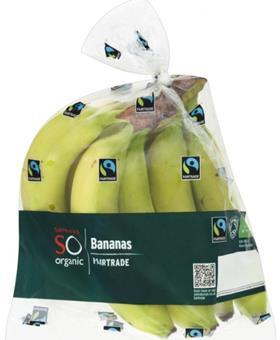
This week bananas became one of the first fresh produce items to see a post-Brexit price rise. The devaluation of the pound has led to several supermarkets hiking their banana prices for the first time in five years with Aldi, Lidl, Asda and Morrisons all increasing the cost of a kilo from 68p to 72p [Produce View].
The staple fruit, which has a higher penetration than almost any other fruit or vegetable, has been at the centre of the ongoing supermarket price war for years, and suppliers’ profits have been squeezed recently by a combination of retail price deflation and the rising cost of imports since the EU referendum.
In spite of this, volume sales this year remain encouraging, rising by 2.2 per cent in the 52 weeks to 6 November, according to Kantar Worldpanel. Sales of organic bananas, in particular, are on the up, with Tesco reporting organic sales rises of 27 per cent in February. And this tallies with the growing popularity of the wider organic food category, which enjoyed a sales rise of six per cent in the 52 weeks to 1 October [Nielsen].
With the well-established Fairtrade and Rainforest Alliance (RFA) campaigns, the banana industry has made big strides in tackling issues such as underpayment, pesticide exposure and inhumane living conditions, although these allegedly persist in some banana operations in Ecuador – claims suppliers reject – according to a 2016 Oxfam report.
In May, Aldi became the latest UK retailer to pledge to source its entire range of bananas from Fairtrade or RFA-certified farms, following hot on the heels of rivals Lidl and Asda. Now four of the UK’s six biggest supermarkets exclusively sell bananas that have been certified as responsibly produced.
Now it seems that consumers are demanding even higher ecological standards too, as demand for organics rises. The organic banana market is looking promising, according to Toni Direito of Compagnie Fruitiere UK. And producers in Ecuador, which supplies almost 10 per cent of Britain’s bananas, are looking to capitalise on this demand by developing their organic offer.
Banabio SA, a grower group based in the province of El Oro, Ecuador’s banana-growing heartland, specialises in marketing organic bananas. Organics now make up the vast majority of its offer and despite the inherent difficulties of organic production – which requires more investment and carries greater potential risks to plant health – the company sees opportunities in the British market thanks to strong demand for high-quality and sustainably-produced fruit.
Another major talking point – and a regular headache – for the banana industry is the weather, with adverse conditions in South and Central America limiting supply. “Storms in Costa Rica, the Dominican Republic and Panama are currently causing concern and could impact on supply in the next few weeks,” says commercial director of SH Pratt, Simon Trewin. “With El Niño and erratic weather, supply has been difficult and prices higher than last season.”
Heavy rainfall in the Dominican Republic in November caused major damage to banana farms in the north of the country and president of the Dominican Banana Association, Simeón Ramírez, announced that around 5,500 hectares of plantations were damaged by floodwater, which caused an estimated £36.7 million worth of damage. As a result Ramírez reported a drop in average exports from 380,000 to 290,000 boxes a week.
In Costa Rica, meanwhile, an ash cloud from the Turrialba volcano in the Atlantic coastal region affected some 3,500ha of banana production at the beginning of November. The ash, which damaged plant roots and burned the skin of the fruit, left blemishes which meant that produce had to be downgraded from premium to second class.
In the long term, UK banana importers will also be concerned about the perennial threat of Panama disease, which affects the dominant Cavendish variety and has wiped out tens of thousands of hectares of plantations in China, Indonesia, Malaysia and the Philippines. British suppliers, which source bananas from Latin America, the Caribbean and, increasingly, West Africa, are yet to be majorly affected however.
“As of yet, the new strain of Panama disease, TR4, has not affected sources that traditionally supply the UK and Europe,” says Direito. “Yes, it does pose a threat to the banana industry, as there is currently no control; however awareness of TR4 has been greatly raised in the last 24 months and growers are now taking more bio-security measures to control the spread or outbreak of the disease.” A breakthrough was made recently in Brazil in the form of a new disease-resistant variety called Belluna, which scientists claim is more resistant to Panama disease, Yellow Sigatoka and Black Sigatoka than other commercial varieties, but experts warn that given the globalisation of the banana trade, and the fact it can be easily transmitted in soil, water and possibly air, cross-border contamination is a real threat.



